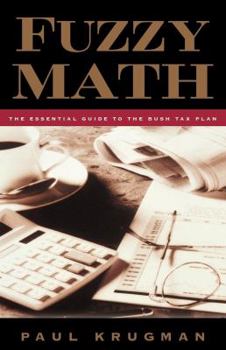Fuzzy Math: The Essential Guide to the Bush Tax Plan
Select Format
Select Condition 
Book Overview
With huge budget surpluses just ahead, the question of whether to cut taxes has shifted to when? and by how much? With Fuzzy Math, Paul Krugman dissects the Bush tax proposal and shows us who wins, who loses, and how quickly the tax cuts will consume the surplus. Always the equal-opportunity critic when it comes to faulty economics, Krugman also tucks into the Democratic alternatives to the Bush plan.
This little book packs a big wallop. Together...
Format:Paperback
Language:English
ISBN:0393339467
ISBN13:9780393339468
Release Date:May 2010
Publisher:W. W. Norton & Company
Length:130 Pages
Weight:0.45 lbs.
Dimensions:0.3" x 5.5" x 8.5"
Customer Reviews
5 ratings
prophetic?
Published by Thriftbooks.com User , 19 years ago
In "Fuzzy Math," Paul Krugman debunks the deceptive hype deployed on behalf of the tax cut of 2001. Krugman points out how so extravagant a tax cut will force serious reductions in services - most likely, to social security. Four years later, pundits and analysts told Americans of the dire threat to social security - a threat those same pundits and analysts dismissed when defending the cuts. As Krugman suggested they would. Still, some might be disappointed to find that Krugman is less prophetic than simply an academic applying basic economic observations in a realistic manner. By clarifying processes of taxation, spending, and budgeting, Krugman succeeds in clearing away fog and myth, offering a healthy handbook for economics to all American citizens.
One of Krugman's best -- brief and informative
Published by Thriftbooks.com User , 22 years ago
Every policy-maker and voter should read this book. After months of Krugman's anti-tac-cut NY Times Op-Eds, I was sick of hearing about this debate. But "Fuzzy Math" literally changed my mind in one night. It is not only a guide to the Bush tax cut but also a layman's guide to general tax policy, tax law, the federal budget, and distributional issues. Not only that, but Krugman provides a novel theory (at least to me) on why anti-big-government ideologues prefer tax cuts for the rich disproportionately over tax cuts for the bottom 99%. Krugman also exposes many statistical and other tricks that policy-makers play on the public in order to promote their programs. In short, this book does so much so thoroughly, and I am amazed that Krugman fit it all into so few pages.
Never have so many voted for so much for so few
Published by Thriftbooks.com User , 22 years ago
Almost as many people voted for Bush as voted for Gore -- and Bush ran on his tax-cut plan. In a slim volume (I read it in two sittings with no problem) Krugman very clearly spells out how the Bush campaign and administration hoodwinked the public into thinking his tax cut was for the middle class.The fact is that 45% of the tax cut goes to the wealthiest 1% of families. Even "working stiffs" earning $400,000 per year get it bad. The truth is revealed in the Treasury departments own released numbers (see Table 7 on page 111) which are cleverly packaged in such a way that they SEEM to say the exact opposite. But Paul Krugman is not fooled, and he explains why you should not be either.Favorite line: (on last page) "But there's a special reason to oppose the Bush plan, quite aside from its actual merits or lack thereof. This is the utter dishonesty of the sales campaign. At every stage of the debate Bush and his people have tried to obscure what they were really proposing."For your own good, you must read this book.
an opinionated book, yet objective, fair, and convincing
Published by Thriftbooks.com User , 22 years ago
This is a superb book. Krugman shows the following: (1) that Bush's tax cut is so large that it will lead to significant problems with maintinaing anything close to current government service levels or in financing any kind of meaningful Social Security reform; (2) that the Bush tax cut is overwhelmingly tilted towards the top 1% of the population. In the process of making this case, Krugman also provides a considerable education on the roles of fiscal policy, the composition of federal taxing and spending, and the nature of the Social Security program. At the same time, Krugman's critique is fair. As he shows, one could make a case for the Bush tax cut if one believes the following: (1) large cuts in marginal tax rates on income and estates of the rich will have extremely large supply-side benefits for the economy; (2) federal services should be cut to levels not seen since the 1920s. However, the Bush Administration has not made this case because there is no popular support for these possible arguments for a tax cut. Rather, the Bush Administration has attempted to disguise the true size and distributional effects of the tax cut. As of this writing, they appear likely to succeed. I wish Krugman's book could have been available a few months ago, when it might have had more influence on the politics of the Bush tax cut.
"FUZZY MATH" clarifies with simplicity and thoroughness.
Published by Thriftbooks.com User , 22 years ago
Whether you find yourself rooting for George Bush's ten-year tax cut plan or against it, Paul Krugman's concise, well documented, and straightforward "Fuzzy Math" will add depth to your argument. If the countless divergent articles, statistical tables, and TV pundit's gibbering commentary, on the subject of George Bush's flagship campaign issue, have failed to satisfy your desire to understand it, you owe it to yourself to listen to Princeton's Proffesor Krugman demystify the issue. What taxes it affects, where the money is coming from, and to whom it is going, are just some of the answers that this brisk and short narrative provides. A must read for anyone interested in the nuts and bolts of "the ten-year tax cut" debate.




